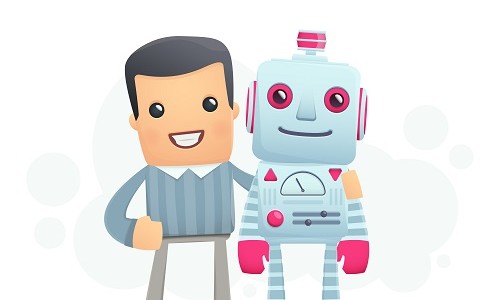Research shows that human beings can empathize with robots, feeling sorry for them when they appear to be in pain (hint: they’re not). Robots can also be programmed to fake empathy for humans. But we’re probably better off with robots that know when humans might actually be in danger and stop before they cause pain.
Sort of empathetic robots
Pepper is a robot programmed to recognize emotions based on facial expressions, body language, and the words a person uses. The robot then alters its behavior based on the perceived emotion. While this looks like empathy, it’s really not.
This is kind of how empathy works though, right? We read cues, we get a sense of how someone feels, and our behavior changes accordingly. Except empathy for humans is more of an spontaneous feeling rather than a calculated response. We share feelings of joy, sadness, or frustration with another person instead of mimicking those feelings.
If someone is wronged, we don’t wait for them to express anger and then join in with a practiced scowl and a exclamation of, “I too am angry”. We get upset because we see someone else getting upset, and know what it feels like to be in that situation. We empathize.
True empathy is difficult to recreate in an artificially intelligent robot. We as humans have a sense of self, we feel, and we connect with others on an emotional level. Empathy stems from intrinsically human responses that are absent in robots programmed with a binary view of the world.
Do we even need empathetic robots?
Creating robots that are truly empathetic poses a big challenge, but is it even that worthwhile? Well, that depends. There are certain types of robots that would benefit from the ability to empathize.
Law enforcement robots and military robots that could determine whether a person lives or dies should probably have an understanding or sense of human emotion.
Robots that are used in search and rescue – treating people who are in shock, injured, or under duress – need to read, understand, and maybe empathize with the people they’re treating.
Even robots intended for socialization, customer service, or any type of human interaction should probably be able to empathize with the people that they interact with.
Industrial robots don’t need empathy.
Industrial robots must be precise, fast, and reliable. They don’t need understand how a person feels and share those feelings, however. Much more useful than empathy would be the ability to detect danger and prevent injuries to human workers.
Let’s say that an industrial robot accidentally crushes a human worker. An empathetic industrial robot might feel bad about the accident, but a sad robot doesn’t do any good in this scenario. If, however, the robot realized that a person was in its path and stopped before causing harm, that would be incredibly useful.
While empathy could prove useful for certain types of robots research for industrial robots should focus more on accident prevention.



